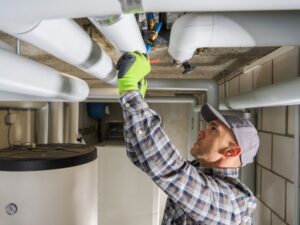
Water is a precious resource, and conserving it not only helps the environment but also reduces your utility bills. With simple plumbing adjustments and mindful practices, you can significantly cut down on water waste in your home. Here are effective tips for conserving water through your plumbing system.
Fix Leaks Promptly
Leaks are a significant source of water waste, with even minor drips accumulating over time. Regular inspections of faucets, toilets, and pipes can prevent this unnecessary water loss. Simple repairs, such as replacing a faucet’s worn-out washer or fixing a toilet’s faulty flapper valve, can conserve gallons of water each day.
Install Water-Efficient Fixtures
Upgrading to water-saving fixtures can substantially lower your household water usage. Installing low-flow showerheads, dual-flush or low-flow toilets, and aerators on faucets maintains pressure while minimizing water flow, helping you save without sacrificing functionality.
Use Your Dishwasher and Washing Machine Wisely
Running full loads in dishwashers and washing machines maximizes water efficiency compared to frequent smaller loads. Taking advantage of eco-friendly or water-saving settings can also optimize water and energy use for a more efficient household.
Collect and Reuse Water
Rain barrels and greywater systems offer ways to collect and reuse water for outdoor tasks like gardening or car washing. Collecting rainwater and reusing household greywater (where permitted) reduces demand on potable water sources while helping you maintain a sustainable landscape.
Optimize Your Landscape
Outdoor water use is often one of the biggest drains on household water resources. Planting drought-resistant or native varieties and using drip irrigation systems can help your yard flourish while keeping water use low. Watering early in the morning or late in the evening also reduces evaporation and retains soil moisture longer.
Adopt Mindful Water Usage Habits
Practicing mindful water habits, such as shortening showers, turning off taps when not in use, and using a bowl to rinse produce, can reduce household water waste. Small changes in daily habits can accumulate into significant water savings over time.
Monitor Your Water Bill
Checking your water bill for unexplained increases can signal leaks or other water-wasting issues. By catching these issues early, you can address them before they result in excess water use or expensive repairs.
Educate Your Household
Encouraging everyone in your household to adopt water-saving practices promotes long-term conservation efforts. Small habits, like reporting leaks and turning off taps, create a more sustainable home environment and instill water-conscious values.
Conclusion
Implementing these plumbing tips and mindful practices supports sustainable water use in your home. By fixing leaks, installing efficient fixtures, collecting rainwater, and practicing mindful habits, you’ll protect this essential resource and save on your water bill. Start small, and incorporate additional strategies gradually for a significant impact on your home’s water conservation efforts.
Leave a Reply